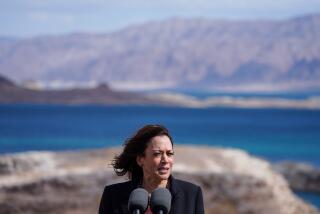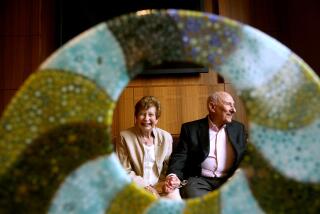UCLA will catalog a noted conservationist’s collection
When Ellen Stern Harris died of cancer five years ago at age 76, the pugnacious conservationist left a vast and chaotic collection of letters, research files, photos and publications.
Last Wednesday,, a UCLA van pulled up to a chilly storage warehouse in West Los Angeles to pick up 28 cartons of materials, carefully organized by an archivist hired through Craigslist. Over the coming months, UCLA plans to digitize the contents to make them available online to scholars and others interested in California’s political and environmental history.
Considered to be the mother of the California Coastal Zone Conservation Act of 1972, Harris was an environmental activist long before the avocation became fashionable. When The Times named her Woman of the Year in 1969, columnist Art Seidenbaum called her “a modern kind of earth mother who fights for land, sea and air…a state official, a community organizer and a most uncommon scold.”
“The UCLA Library is honored to receive [Harris’] papers, which will enable scholars, students and community members to study the environmental movement in Southern California and beyond,” said Gary E. Strong, university librarian. The material joins other holdings at UCLA, including special collections about natural resources and an oral history series.
Archivist Loretta Ayeroff has worked on the project since October 2006. She said Harris’ broad interests made it difficult at first to determine what was valuable and what could be tossed. Initially faced with more than 200 bankers boxes of barely sorted material, “I was completely overwhelmed,” Ayeroff said. “There were days when I practically froze.”
Although Ayeroff never met Harris, she said she has been inspired by her work. “When you look at her books and reports and journals, the articles were underlined and highlighted and notes were written in the margins,” Ayeroff said. “She studied everything and educated herself. It doesn’t surprise me that she could have conversations with” scientists and political leaders.
A third-generation Californian, Harris chose marriage rather than college. As the mother of two children, she successfully agitated against a lackadaisical city bureaucracy to get the palm trees on her Beverly Hills street trimmed.
Later divorced, she lobbied state legislators to protect the Santa Monica Mountains, served on the Los Angeles Regional Water Quality Control Board, and advised mayors and governors on rapid transit and energy policy. She also produced a consumer affairs public-access TV program and held regular ballot parties at her home, where activists rigorously debated issues of the day.
One young scholar has already had the pleasure of plowing through Harris’ archives. On a couple of visits in 2009, Sara Fingal, a doctoral candidate at Brown University who grew up in Laguna Niguel, pored over Harris’ files to learn about her role in coastal politics.
“She was a passionate advocate for water pollution prevention, conscientious shoreline planning and public access,” said Fingal, who plans to cite the material in her forthcoming dissertation, “Turning the Tide: Conflict, Leisure and Access Along the Coast.”
Ayeroff said she was struck by the foresight reflected in Harris’ papers. Long before the BP disaster in the Gulf of Mexico, she warned of the dangers of oil spills. Long before the Japanese earthquake and tsunami, she voted against expanding San Onofre, San Diego County’s oceanfront nuclear plant.
In 1972, Harris helped pass Proposition 20, a statewide initiative, co-writing what became the original California coastal act, and then served as the first woman on the newly formed California Coastal Commission. After the act was revamped by 1976 legislation, she left as vice chairwoman and became a vocal critic of the panel, saying it had failed to stop coastal overdevelopment or ensure public access to beaches.
Through the decades, Harris urged those she encountered to get involved in the government process. Her chief mission, Ayeroff said, was “inspiring people to become citizen activists.” As Harris once said: “Don’t let the experts frighten you. But be appalled! You must be appalled!”
More to Read
Sign up for Essential California
The most important California stories and recommendations in your inbox every morning.
You may occasionally receive promotional content from the Los Angeles Times.











